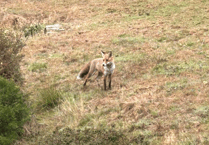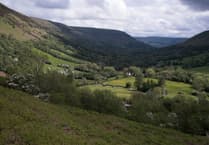Radnorshire Wildlife Trust has teamed up with The Rare British Plants Nursery, to give some of Wales’ rarest wild plants a new home at Pentwyn Farm, a 164-acre site near Llanbister in Mid Wales.
The site is being transformed through rewilding and nature-led restoration to boost biodiversity and help wildlife thrive.
Across Radnorshire, many native plants have declined due to agricultural intensification and pollution. As part of the rewilding project at Pentwyn, rare plants are being reintroduced that cannot recolonise naturally because they have become so rare and isolated in the wider agricultural landscape.
The Rare British Plants Nursery identified ten rare native plants and one lichen species suitable for introduction to Pentwyn. Four of these are officially recognised as ‘species of principal importance to Wales’ under Section 7 of the Environment (Wales) Act 2016.
The rare plant introductions will not only boost plant diversity at Pentwyn but also support pollinators, fungi, invertebrates and other wildlife.
Andrew Shaw, Director of The Rare British Plants Nursery said: “The Pentwyn project is really exciting because it is showcasing how rare plants can be successfully returned to the countryside when favourable management and less intensive farming practices are restored. I am hoping that this project will encourage other landowners and land managers to set aside a little space for rare plants.”
The first introductions at Pentwyn took place in March 2025 and saw the introduction of Globeflower, Mountain Pansy, Wood Bitter-vetch, and Annual Knawel.
Thirty-six local schoolchildren also joined the project, helping plant Brecon Dandelion seeds. This critically rare Welsh endemic is only known from a handful of sites in Wales and is not found anywhere else in the world. It has been lost from a number of its historic Welsh localities and by establishing an ark population at Pentwyn, Brecon Dandelion will be safeguarded for the future.
More recently, Pentwyn welcomed its first lichen introduction, Tree Lungwort. As its name suggests, this involved a bit of tree climbing in order to attach the lichen to the branches of trees. It is hoped that over time the lichen will spread naturally into surrounding woodland.
The project is ongoing, Melancholy Thistle will be planted this autumn, while Tubular Water-dropwort will be planted in 2026, following the creation of an extensive new wetland.
To follow Radnorshire Wildlife Trusts work at Pentwyn Farm, visit www.rwtwales.org and sign up to the Trust’s monthly digital newsletter.





Comments
This article has no comments yet. Be the first to leave a comment.